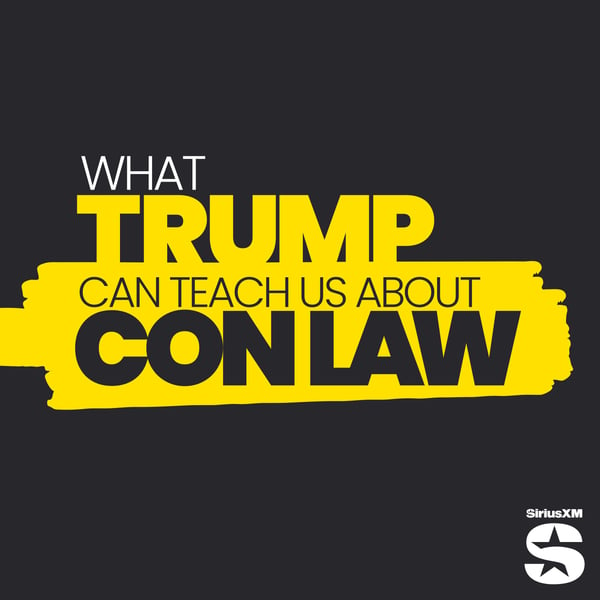54- Bong Hits for Jesus
What Roman Mars Can Learn About Con Law
Roman Mars
4.8 • 4.1K Ratings
🗓️ 2 July 2021
⏱️ 34 minutes
🧾️ Download transcript
Summary
Transcript
Click on a timestamp to play from that location
| 0:00.0 | Okay, so we're talking on Monday, June 28th, and what are we going to learn about Con Law this month? |
| 0:06.5 | So it's the beginning of the summer, and that usually means the end of the Supreme Court term. |
| 0:11.1 | And that usually means that the most important and interesting cases tend to come at the very end of the term in June. |
| 0:20.1 | So, well, the Court isn't quite done as of today. I thought we could talk about a couple of noteworthy cases that the Court's just decided in the past week or so. |
| 0:29.6 | That sounds great. |
| 0:50.4 | This is what Trump can teach us about Con Law. |
| 0:52.8 | And on going series, that I promise I'm going to rebrand it eventually. I think I even have a name in mind, where we take the current events in the world of government and politics and use them to examine our constitution like we never have before. |
| 1:05.8 | Our music is from DOOMTree Records, our professor and neighbor is Elizabeth Jo. And I'm your fellow perpetual student and host, Roman Mars. |
| 1:13.8 | The first case is the third of three cases about some really basic questions about the Affordable Care Act, or sometimes people call it Obamacare. |
| 1:31.8 | It's kind of like a long-running trilogy where disaster looms in each episode except the disaster here is the potential dismantling of the Affordable Care Act. |
| 1:41.8 | A lot of which is pretty popular for most Americans if you look at the surveys. Nevertheless, there have been relentless court challenges ever since President Obama signed the ACA into law. That was in 2010. |
| 1:55.8 | So as it was written, the ACA expands health insurance availability to Americans. There's a bit of a carrot and stick approach. The carrot is offering subsidies, that means helping to pay for the cost of health insurance for people who can't afford it, middle and low income Americans. |
| 2:13.8 | And the stick is what's called the individual mandate. You have to get health insurance. Not just if you're sick, but if you're healthy too, if you think you don't need it. And if you refuse to get insurance, you have to pay what was then called the shared responsibility payment. |
| 2:30.8 | Now in 2012, the Supreme Court looked at a challenge to that individual mandate, which was really a keystone of the ACA. The challenge here in that 2012 case was, can Congress do that? Can Congress make people buy health insurance? Do they have a constitutional power to do that? |
| 2:52.8 | Well, in 2012, the Supreme Court said, well, one of the constitutional powers they were considering, the Commerce Clause, wasn't really a basis for Congress to ask every American to get health insurance. |
| 3:06.8 | But remember, there was a stick approach here and the individual mandate meant that if you didn't buy health insurance, you had to basically pay a fine. And it was that fine, the courts said in 2012, that could be justified as a tax. |
| 3:23.8 | And Congress certainly has what's called the taxing power. So the basic idea here is that the penalty for not getting health insurance could be characterized as a tax. |
| 3:33.8 | And the Supreme Court has for a very long time interpreted Congress's taxing authority in a very expansive way. And so the idea here is that even though a tax could be used to try and incentivize behavior or to discourage people from doing something, that's okay. |
| 3:51.8 | And Congress can even regulate with its so-called taxing authority. So obviously a fine if you don't pay for health insurance. And the Supreme Court says in 2012, well, that's okay. So the Obamacare as of 2012 seems to survive. |
| 4:05.8 | That's not the end of it. Part two of this trilogy. In 2015, the Supreme Court considered another case called King versus Burwell. |
| 4:14.8 | So remember that carrot of the ACA is to provide subsidies. Now, the problem here is that the ACA created these exchanges that allowed people to shop for insurance plans if they didn't have health insurance. |
| 4:27.8 | And there was a set of options. The states could set them up themselves or you could just let the federal government do it. And a lot of states decided they would let the federal government run these exchanges. |
... |
Please login to see the full transcript.
Disclaimer: The podcast and artwork embedded on this page are from Roman Mars, and are the property of its owner and not affiliated with or endorsed by Tapesearch.
Generated transcripts are the property of Roman Mars and are distributed freely under the Fair Use doctrine. Transcripts generated by Tapesearch are not guaranteed to be accurate.
Copyright © Tapesearch 2025.

